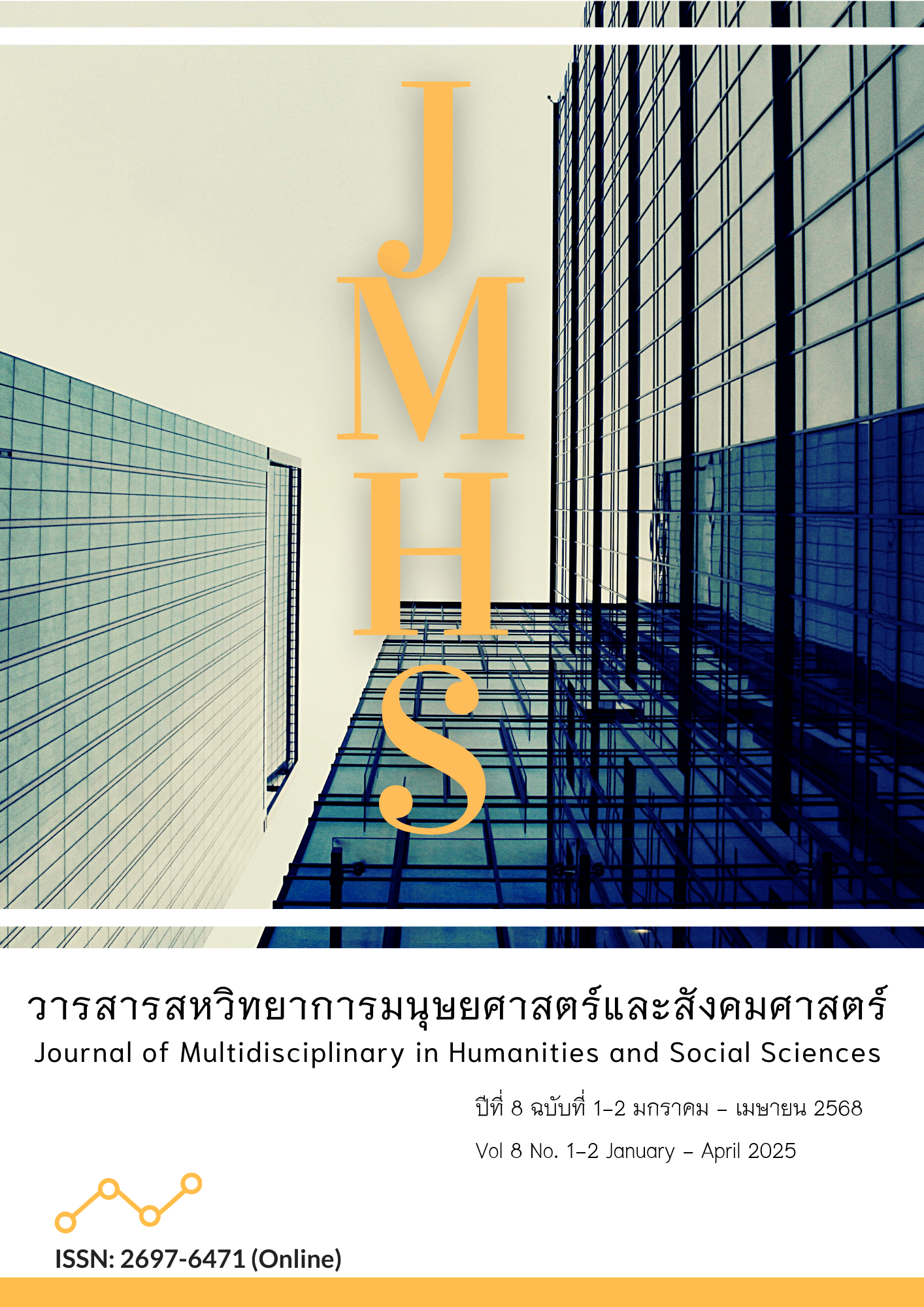ปัจจัยที่มีอิทธิพลต่อประสิทธิภาพในการดำเนินงานของร้านอาหารที่ให้บริการเต็มรูปแบบในกรุงเทพมหานคร
Main Article Content
บทคัดย่อ
บทความนี้มีวัตถุประสงค์เพื่อ 1) วิเคราะห์องค์ประกอบเชิงยืนยันของปัจจัยที่ส่งผลต่อประสิทธิภาพในการดำเนินงานของร้านอาหารที่ให้บริการเต็มรูปแบบ 2) ศึกษาปัจจัยที่ส่งผลต่อประสิทธิภาพในการดำเนินงานของร้านอาหารที่ให้บริการเต็มรูปแบบ 3) สร้างแบบจำลองสมการโครงสร้างของปัจจัยที่ส่งผลต่อประสิทธิภาพในการดำเนินงานของร้านอาหารที่ให้บริการเต็มรูปแบบ และ 4) เสนอแนวทางการเพิ่มประสิทธิภาพในการดำเนินงานของร้านอาหารที่ให้บริการเต็มรูปแบบ รูปแบบ การวิจัยเป็นแบบผสานวิธี ใช้แนวคิดการมุ่งเน้นความเป็นผู้ประกอบการ ความสามารถด้านนวัตกรรม ความได้เปรียบในการแข่งขันอย่างยั่งยืน และประสิทธิภาพในการดำเนินงาน เป็นกรอบการวิจัย เพื่อให้ได้องค์ความรู้ใหม่ที่นำไปประยุกต์ใช้กับการดำเนินงานของร้านอาหารที่ให้บริการเต็มรูปแบบในกรุงเทพมหานครเพื่อให้ประสิทธิภาพในการดำเนินงานเพิ่มสูงขึ้น พื้นที่วิจัย คือ กรุงเทพมหานคร กลุ่มตัวอย่าง คือ ร้านอาหารที่ให้บริการเต็มรูปแบบ ที่ขึ้นทะเบียนกับ สสว. ในปี พ.ศ. 2565 ทุกขนาดธุรกิจ จำนวน 394 ราย ใช้วิธีคัดเลือกกลุ่มตัวอย่างตามความสะดวก ผู้ให้ข้อมูลหลัก คือ ผู้มีประสบการณ์ด้านการมุ่งเน้นความเป็นผู้ประกอบการ เครื่องมือที่ใช้ในการวิจัยมี 2 ชนิด คือ 1) แบบสอบถาม และ 2) แบบสัมภาษณ์แบบกึ่งโครงสร้าง วิเคราะห์ข้อมูลโดยใช้สถิติแบบจำลองสมการโครงสร้าง ส่วนการวิจัยเชิงคุณภาพใช้วิธีการวิเคราะห์เนื้อหา ผลการวิจัยพบว่า 1) ตัวแปรสังเกตได้ที่สามารถรับอิทธิพลจากตัวแปรแฝงได้มากที่สุด ได้แก่ การเติบโตของกำไร 2) ปัจจัยที่ส่งผลต่อประสิทธิภาพในการดำเนินงานของร้านอาหารที่ให้บริการเต็มรูปแบบในกรุงเทพมหานคร มากที่สุด ได้แก่ การเติบโตของกำไร 3) ตัวแปรที่มีอิทธิพลทางตรงต่อประสิทธิภาพในการดำเนินงานมากที่สุด ได้แก่ ความได้เปรียบในการแข่งขันอย่างยั่งยืน 4) แนวทางการเพิ่มประสิทธิภาพของร้านอาหาร คือ การมีประสบการณ์ในการทำร้านอาหาร มุ่งเน้นความเป็นผู้ประกอบการ นำนวัตกรรมมาใช้ สร้างความได้เปรียบในการแข่งขัน และเพิ่มประสิทธิภาพจากส่วนแบ่งการตลาดและความพึงพอใจของลูกค้า องค์ความรู้จากงานวิจัยนี้ สามารถนำไปใช้ในการพัฒนากลยุทธ์การดำเนินงานของร้านอาหาร โดยมุ่งเน้นความเป็นผู้ประกอบการ เลือกนวัตกรรมให้เหมาะสม เพื่อให้เกิดความสามารถในการแข่งขันอย่างยั่งยืนและเพิ่มประสิทธิภาพในการดำเนินงาน
Article Details

อนุญาตภายใต้เงื่อนไข Creative Commons Attribution-NonCommercial-NoDerivatives 4.0 International License.
ทัศนะและความคิดเห็นที่ปรากฏในวารสาร ถือเป็นความรับผิดชอบของผู้เขียนบทความนั้น และไม่ถือเป็นทัศนะและความรับผิดชอบของกองบรรณาธิการ
เอกสารอ้างอิง
Alroaia, Y. V., & Baharun, R. B. (2018). Identification and prioritizing influential factors on entrepreneurial success: a case study of SMES In Iran and Malaysia. Polish Journal of Management Studies, 17(2), 31-40. https://doi.org/10.17512/pjms.2018.17.2.03
Atul, S. (2022). 2021–2022 Restaurant industry performance and the JHFM index. The Journal of Hospitality Financial Management, 30(1), 1-3, https://doi.org/10.7275/38k8-ym60
Chaiyasain, C. (2021). Why do restaurant business fail and the guidelines necessary to develop excellence. Journal of Thai Hospitality and Tourism, 16(2), 85–96. Retrieved from https://so04.tci-thaijo.org/index.php/tourismtaat/article/view/154334
Comrey, A. L., & Lee, H. B. (1992). A first course in factor analysis. (2nd ed.). New Jersey: Lawrence Erlbaum.
Costello, A. B. & Osborne, J. (2005). Best practices in exploratory factor analysis: four recommendations for getting the most from your analysis. Practical Assessment, Research, and Evaluation, 10(1), 1-7. https://doi.org/10.7275/jyj1-4868
Department of Business Development. (2022). Legal entity data for the year 2022. Retrieved from https://www.dbd.go.th/download/document_file/Statisic/2565/H26/H26_2022.pdf
Egiyi, M. A. (2023). Financial management in startups: analyzing unique accounting challenges and strategies. Contemporary Journal of Management 5(4), 64-80. https://doi.org/10.5281 /zenodo.10440639
Elgarhy, S. D., & Abou-Shouk, M. (2023). Effects of entrepreneurial orientation, marketing, and innovation capabilities, on market performance: the mediating effect of sustainable competitive advantage. International Journal of Contemporary Hospitality, 35(6), 1986-2004. https://doi.org/10.1108/IJCHM-04-2022-0508
Fernando, Y., Jabbour, C. J. C., & Wah, W-X. (2019). Pursuing green growth in technology firms through the connections between environmental innovation and sustainable business performance: does service capability matter?. Resources, Conservation & Recycling, 141, 8-20. https://doi.org/10.1016/j.resconrec.2018.09.031
Government Savings Bank Research Center. (2023). Economic and business research: restaurant business. Retrieved from https://www.gsbresearch.or.th/gsb/ published-works/economic-and-business-research/10876/
Guest, G., Bunce, A., & Johnson, L. (2006). How many interviews are enough? an experiment with data saturation and variability. Family Health International, 18(1), 59-82. https://doi.org/ 10.1177/1525822X05279903
Ha, S. T., & Tran, M. D. (2019). Crafting sustainable competitive advantages through usage of core competences for restaurant chains in Vietnam. Journal of Economics and Sustainable Development, 10(7), 10-16. https://doi.org/10.7176/JESD
Hair, J. F., Anderson, R. E., Babin, B. J., & Black, W. C. (2010). Multivariate data analysis: a global perspective. (7th ed.). New Jersey: Pearson.
Hair, J. F., Hult, G. T. M., Ringle, C. M., Sarstedt, M., Danks, N. P., & Ray, S. (2021). Evaluation of reflective measurement models. In Partial Least Squares Structural Equation Modeling (PLS-SEM) using R. Classroom Companion: Business (pp. 75-90). Springer. https://doi.org/ 10.1007/978-3-030-80519-7_4
Khan, M. A., Zubair, S. S., Rathore, K., Ljas, M., Khalil, S., & Khalil, M. (2021). Impact of entrepreneurial orientation dimensions on performance of small enterprises: do entrepreneurial competencies matter?. Business & Management, 8(1), 1-18. https://doi.org/
1080/23311975.2021.1943241
Khunkaew, A. (2019). Statistics for research. (2nd ed.). Bangkok: Chulalongkorn University.
Lee, C., Hallak, R., & Sardeshmukh, S. R., (2016). Drivers of success in independent restaurants: a study of the Australian restaurant sector. Journal of Hospitality and Tourism Management, 29, 99-111. https://doi.org/10.1016/j.jhtm.2016.06.003
Lee, S., & Yoo, J. (2021). Determinants of a firm’s sustainable competitive advantages: focused on Korean small enterprises. Sustainability, 13(1), 346-362. https://doi.org/10.3390/su 13010346
Mahalanobis, P. C. (1936). On the generalised distance in statistics. Proceedings of the National Institute of Sciences of India, 2(1), 49-55.
Mahdi, O. R., Nassar, I. A., & Almsafir, M. K. (2017). Knowledge management processes and sustainable competitive advantage: an empirical examination in private universities. Journal of Business Research, 94, 320-334. https://doi.org/10.1016/j.jbusres. 2018.02.013
Mulyana, M., & Hender, H. (2020). Market and entrepreneurial orientation on business performance: role of networks innovation agility. Journal of Small Business & Entrepreneurship, 35(6), 944-960. https://doi.org/10.1080/08276331.2020.1855025
Mutuku, A. K., Kiilu, B. N., Mathuku, P., & Auka, D. O. (2022). Effect of entrepreneurial skills on organizational performance of small and medium enterprises in Nakuru City-Kenya. International Journal of Economics and Business Administration, 5(3), 156-173. https://doi.org/10.35808/ijeba/782
Nimfa, D. T., Uzir, M. U. H., Maimako, L. N., Eneizan, B., Latiff, A. S. A. L., & Wahab, S. A. (2021). The impact of innovation competitive advantage on product quality for sustainable growth among SMEs: an empirical analysis. Journal of Business Science and Applied Management, 16(3), 39-62. https://doi.org/10.69864/ijbsam.16-3.152
Office of Small and Medium Enterprises Promotion. (2023). SME situation analysis: situation analysis and MSME business analysis by business sector (quick study) 2021: MSME business analysis in the restaurant business sector. Retrieved from https://www.sme.go.th/upload/mod_download/download-20210909160132.pdf
Pezenka, I., & Weismayer, C. (2020). Which factors influence locals’ and visitors’ overall restaurant evaluations?. International Journal of Contemporary Hospitality Management, 32(9), 2793-2812. https://doi.org/10.1108/IJCHM-09-2019-0796
Ramli, N. A., Latan, H., & Solovida, G. T. (2018). Determinants of capital structure and firm financial performance-a PLS-SEM approach: evidence from Malaysia and Indonesia. The Quarterly Review of Economics and Finance, 71, 1-35. https://doi.org/10.1016/j.qref.2018. 07.001
Rattanaparinyanon, H., Vuthisopon, S., Saengnoree, A., & Siripongdee, S. (2024). Drivers of revisit intentions at Michelin-starred restaurants in Thailand: the role of innovation, quality, and satisfaction. Pakistan Journal of Life and Social Sciences, 22(2), 12163-15181. https://doi.org/10.57239/PJLSS-2024-22.2.00870
Sheth, J. (2020). Impact of COVID-19 on consumer behavior: will the old habits return or die? Journal of Business Research, 117, 280-283. https://doi.org/10.1016/j.jbusres.2020.05.059
Teeshapotiwarakun, C., & Tananpang, C. (2022). Modelling of Thai restaurant performances under a new normal business. Journal of Positive School Psychology, 6(8), 6753-6763.
Teguh, S., Hartiwi, P., Ridho, B. I., Bachtiar, S. H., Synthia, A. S., & Noor, H. A. (2021). Innovation capability and sustainable competitive advantage: an entrepreneurial marketing perspective. Journal of Asian Finance, Economics and Business, 8(5), 127-134. https://doi.org/10.13106/jafeb.2021.vol8.no5.0127
Widyanti, S., & Mahfudz, M. (2020). The effect of entrepreneurial orientation, use of information technology, and innovation capability on SMEs' competitive advantage and performance: evidence from Indonesia. Diponegoro International Journal of Business, 3(2), 115-222, https://doi.org/10.14710/dijb.3.2.2020.115-122


